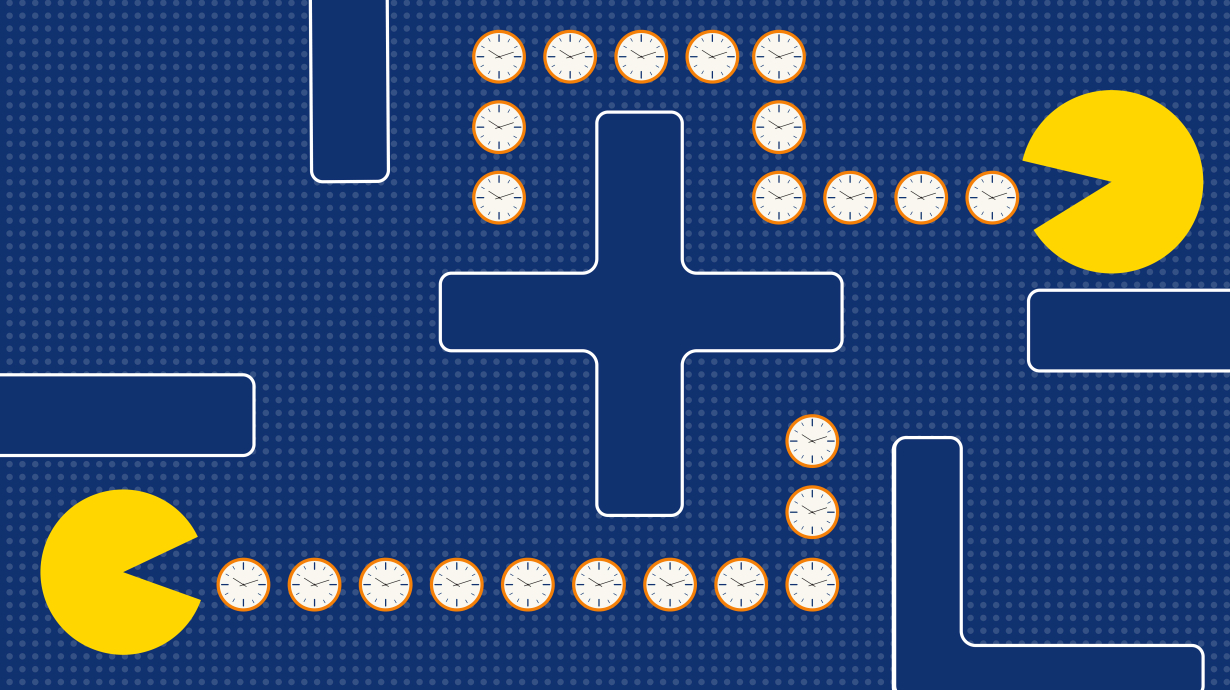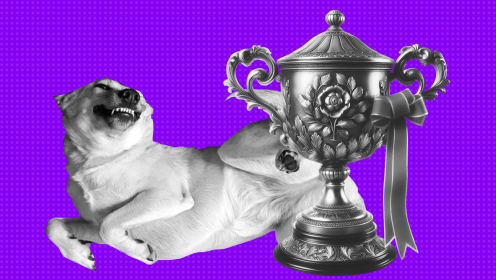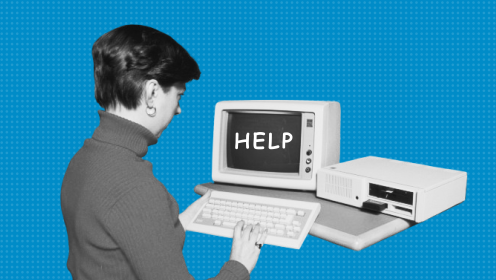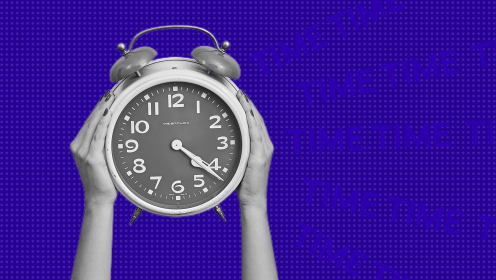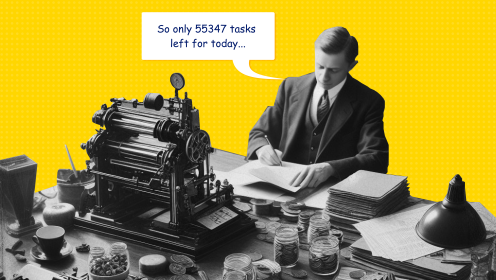Plans are made, the work laptop is open, documents are loading... Then, somehow, a phone ends up in your hands: one short video, two short videos, three short videos, and suddenly it's lunchtime, and the report is still not submitted (or even started).
What happened? Time eaters have intervened. Now we'll explain how to recognize these enemies and manage them—and, in general, why we lose productivity and how to tackle it.
What Are Chronophages?
📌 Chronophages (from the Greek "chronos" meaning time, and "phage" meaning to eat) are people or things that distract you from your tasks, disrupt your plans, and prevent you from concentrating.
This is how time wasters are referred to in time management terminology. We fight them (or at least try to), but not always successfully.
Here’s how it happens:
- When a lot of time slips away without any benefit or pleasure, that’s the work of chronophages.
- When you've had a busy day, but there’s no tangible result, and you feel unproductive and exhausted—that’s also a sign that chronophages have been at work.
Let’s identify the main types of time eaters.
Types of Chronophages
Animated and Inanimate
Chronophages can be either animated (living) or inanimate (non-living), with the former being people who distract you and the latter being objects or phenomena that steal your time.
Animated Chronophages
- Chatty people from your close circle. These are colleagues, relatives, or friends who love to bend your ear and chat about everything under the sun. They could be extroverts, energy vampires, gossips, or complainers—or worse, all of the above.
- Unsolicited calls. This includes calls for social surveys or advertisements.
- Online chats with friends. Especially those that involve exchanging memes and funny videos.
❗ It's important to note that discussing problems or work-related issues doesn't count as chronophages. Even small talk by the water cooler can be useful sometimes! In general, there’s nothing wrong with socializing, as long as it doesn’t distract you from important tasks.
Inanimate Chronophages
- Social media. Scrolling through news feeds, watching reels, new YouTube videos, web surfing, and so on—unless you’re specifically training your observation skills!
- Video games. Neurobiologists believe that games can cause addiction similar to that of psychoactive substances.
- Daydreaming. This is when you come home in the evening, sit on your bed, and zone out for 20 minutes with one sock half-off.
- Vanished time. This includes time lost in traffic jams, queues, or when stuck in an elevator.
- Procrastination. When you intended to search "How to enroll a child in kindergarten," but half an hour later, you find yourself searching for "What do baby hedgehogs look like?" (like tiny white cacti—don’t go check it out now!)

Controllable and Uncontrollable Chronophages
These are the time eaters that you can anticipate and catch in the act, and those that are beyond your control.
Controllable Chronophages are the ones you can predict:
- Goofing around on YouTube
- Checking non-work-related emails
- Social media browsing
- Chatting with friends
Uncontrollable Chronophages are more challenging—they're things that don't depend on us, are hard to predict, and strike unexpectedly:
- A child falling ill
- Car breaking down
- Traffic jams, accidents, or snowstorms
- Work laptop actually breaking down
- Server going down
- A colleague or contractor being late for a meeting
Causes of Chronophages
- Poor planning
When tasks and plans are poorly organized, it leads to one task piling on top of another ➡️ missed deadlines ➡️ derailed plans ➡️ aaaah! No results, but plenty of time wasted here and there.
- Tempting distractions
These are the things that provoke procrastination. The urge to scroll through social media or laugh at reels. Sometimes it’s laziness, sometimes a lack of motivation, or sometimes freezing in front of a big task or a long to-do list.
- Excessive attention to details
Or total perfectionism. For example, instead of filling your presentation with substance and important details, you spend time choosing fonts and making it look perfect.
- Taking on too much
The desire to be a responsible employee is admirable, but as they say, the road to hell is paved with good intentions. Taking on too many tasks can cause you to miss important ones due to a lack of time. As a result, you end up doing a bunch of minor tasks that don't bring significant results, leading to a sense of wasted time.
- Unclear goals
A lack of clear understanding of why you're doing what you're doing. When there’s no goal, you make many unnecessary moves, get bogged down in minor tasks, and quietly lose time.
- Stress
Fatigue tends to accumulate, causing you to lose focus and get stuck on the simplest tasks. The brain goes into "energy-saving mode" to rest, and the time spent thinking about anything increases.
- Factors beyond your control
We've already listed possible force majeure events, and you’ve likely encountered them often.
The Impact of Chronophages on Productivity
Chronophages are enemies of productivity that hinder progress toward your goals. The more time you spend on them, the less time you have for truly important tasks.
Let’s look at a couple of examples of how chronophages negatively impact goal achievement.
Ethan
Designer Ethan scrolled through his feed until the app said, "That's all for now," but never got around to finishing the presentation due the next day. This earned him the unofficial title of "worst employee," as he had to work on the presentation all night and give it half-asleep the next morning. His colleagues noticed that something clearly went wrong for Ethan, so the next time, they entrusted the presentation to someone else.
Emma
Like Scarlett O'Hara, copywriter Emma lived by the famous phrase, "I'll think about it tomorrow." In her personal life, the consequences of this mantra were less noticeable. But when Emma kept postponing her article "until tomorrow" until the final deadline passed, it turned out her boss wasn’t a fan of classic literature—or irresponsible employees.
Combating Chronophages in Time Management
To identify and tackle chronophages, you need to:
- 1. Turn off notifications. The fewer push notifications popping up in front of you, the better.
- 2. Track where your time goes. You can either jot down all your activities throughout the day, including the most insignificant ones, in a notebook, or you can use a planner and log everything there.
- 3. Create an honest daily time log — more on this below. Review it—were all these actions necessary? Did something take too much time? Was any time wasted?
- 4. Evaluate and prioritize tasks. This will help you focus on what truly matters and avoid distractions.
Here are specific techniques for combating chronophages.
Time Logging
Time logging involves recording all tasks you perform throughout the day, along with the time spent on each.
How to do it:
- Write it down on paper
- Record it on a voice recorder
- Use a calendar
- Or an app, such as WEEEK
The results might surprise you. It may turn out that you don't need to stay late at work every day—simply cutting out a couple of unnecessary smoke breaks with colleagues could be enough.
| Time | Action |
|---|---|
| 6 AM | Wake up |
| 6:30 to 8 AM | Shower, breakfast, getting ready |
| 8 to 9 AM | Commute |
| 9 to 9:15 AM | Preparing the workplace |
| 9:15 to 9:30 AM | Coffee |
| 9:30 to 10:30 AM | Top-management meeting |
| 10:30 AM to 12:15 PM | Carrying out orders from the boss |
| 12:15 to 1 PM | Lunch |
| 1 to 4 PM | Making a presentation for tomorrow |
| 4 to 6 PM | Preparing a speech |
| 6 to 7 PM | Commute |
| 7 to 8 PM | Dinner with family |
| 9 to 10 PM | Watching "House of the Dragon" |
| 10 to 11 PM | Shower, getting ready for sleep |
Time Audit
A disciplined time audit involves tracking your activities over several consecutive days.
How to conduct it:
- 1. Set aside two to three days. One day isn’t enough; you need to observe the patterns over time.
- 2. Use a spreadsheet for time auditing. Here’s our template for this purpose.
- 3. Set an hourly timer.
- 4. When the timer goes off, write down everything you did during that hour. Yes, even watching that reel with the cats.
- 5. After a few days review, analyze, and draw conclusions from the data.
Work Visualization
This method is described in Dominica DeGrandis' book "Making Work Visible." The author recommends using Kanban boards to identify the following time wasters:
- Large volumes of unfinished tasks
- Unknown dependencies
- Unplanned work
- Conflicting priorities
- Abandoned work
By default, tasks should be organized into three basic columns: To Do, In Progress, Done. Then, customize the board to fit your own workflow and processes. Next, review and analyze the resulting columns.
📌 It's important to note that 80% of the time work is waiting for its turn, which can be problematic if too many tasks accumulate in the "In Progress" column. Regularly reviewing outdated tasks and removing them from sight is also necessary.
Analyzing Questionable Tasks
Divide a sheet of paper into four columns:
- 1. In the first column, list tasks that are unrelated to work, carry no meaningful value, but you somehow end up doing them.
- 2. In the second column, record the time spent on these tasks.
- 3. In the third column, note the benefits these tasks provide, such as self-expression, creativity, relaxation, etc.
- 4. The fourth column is filled out after analyzing their importance—here, write down how much time you can reasonably allocate to these tasks without harming the rest of your day.
Planning
Here are several planning methods:
- Task Grouping
Divide tasks into three categories: for example, morning, afternoon, and evening. This way, they are tied to specific times, reducing the temptation to procrastinate.
- Time Blocks
For instance, allocate an hour in the morning for writing a book and stick to that activity. Or reserve an hour in the evening for studying and follow the schedule diligently.
- Prioritized Planning
Also known as priority-based planning. Distribute tasks by importance: tackle the most critical and urgent ones first while you have the most energy, then move on to minor tasks and enjoy a well-deserved break.
Task Combination
This involves filling free time with productive activities. For example, while waiting in line at the doctor's office, you could check your email, read expert blogs, or write to your loved ones.
Another option is to listen to a lecture or a useful podcast while walking your dog or exercising. Experiment to see which tasks can be combined without compromising the quality of results.
Building Discipline
Set deadlines for your tasks—and stick to them. Create a schedule—and follow it. Turn off social media and resist getting lost on YouTube. In short, it’s all in your hands and your willpower.
Time Management Tips from WEEEK
- Don’t forget to take breaks. This helps you maintain focus and allows for recovery.
- Eliminate distractions. Use silent mode while working on tasks and set app time limits. It works—we’ve tested it!
- Pace yourself. Don’t overload your day with too many tasks—they won’t magically complete themselves. This way, you’ll maintain a reasonable pace, get rest, and achieve success in your endeavors. And remember, work isn’t going anywhere.
- Self-discipline is key. Yes, we’re emphasizing this again!
The Story of Bill Gates and His Chronophages
Chronophages can cause both work and personal tasks to be delayed, eventually piling up into a mess that might blow up one day.
Take Bill Gates, for example. In interviews and Reddit discussions, he admitted, "No one praised me because I did everything at the last minute." At one point, his laziness even affected his academic performance: "I didn’t watch those lectures (on organic chemistry) and ended up with a failing grade," Gates shared.
When he entered the business world, Gates realized that entrepreneurs value meeting deadlines and promptness, and procrastination is not looked upon favorably.

Let's Keep It Short and to the Point
- Chronophages are people or things that distract you, derail plans, and prevent focus.
- They can be animated (conversations and chats) or inanimate (reels and queues), controllable (web surfing or checking email) or uncontrollable (a late colleague or a sick child).
- Causes of chronophages: distractions, poor planning, excessive attention to details, taking on too much, unclear goals, misplaced priorities, and stress.
-
To identify chronophages: turn off notifications, track your time, evaluate and prioritize tasks, and make a list of all tasks for the day.
- Combat methods include time logging, time audits, planning, analyzing questionable tasks, task combination, and building discipline.
- Time management tips: take limited breaks, eliminate distractions (silent mode!), take care of yourself, and maintain discipline.








